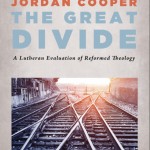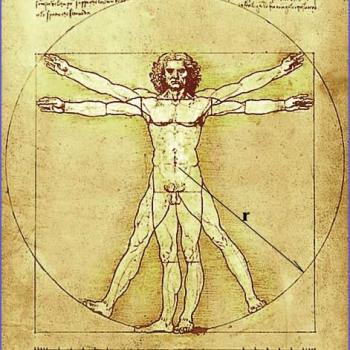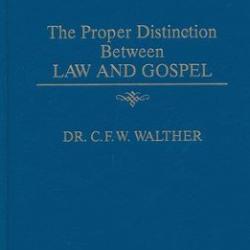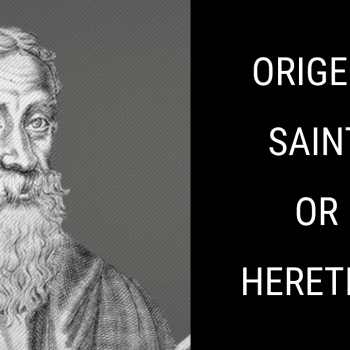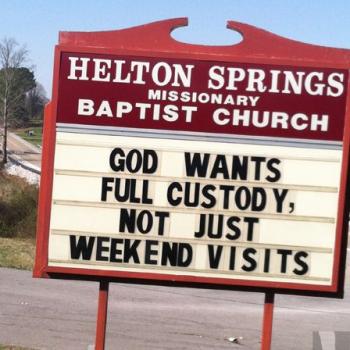First of all, this post is not about the recent Wheaton college controversy (see last post here), but I think it is likely highly relevant to the situation. It seems increasingly clear that persons like Larycia Hawkins and Miroslav Volf, in spite of their vaunted tolerance, simply have zero respect for the views that Wheaton’s administration holds. Volf has insinuated or directly spoken of hatred, enmity, and bigotry and added that the removal of Hawkins was morally wrong. Hawkin’s recent public statement in no way attempts to conceal but in fact reveals the contempt she has for those who would challenge her.
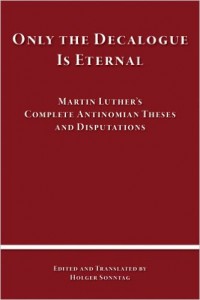
The content of the video above is, I suspect, what a lot of persons in the Evangelical Christian camp (and yes, perhaps some in my own more conservative Lutheran camp) believe but not all of them will say – at least yet. This more courageous man, Eric Reitan, very nicely articulates (making very clear and understandable!) the main ideas behind progressive religion – really “progressive Christianity” (this is why it makes sense that many of us might find ourselves very attracted to certain things that he talks about, for example, the objective goodness of creation, the seemingly unnatural rejection of concepts like “fate”, the sacred dignity of each human being, etc.), something I think can only really exist where traditional Christianity is also a presence. What I am saying is that the presence of Christianity has had and continues to exert a world-leavening effect which makes a Christian heresy like this possible (see the summary here for more).

Reitan talks about how this progressive religion is a “religion of hope” and the alternative religion is a superstitious “religion of fear”, based on punishment (though he acknowledges great overlap, saying progressive religion has elements of fear as well, but tries to minimize this in itself and others). I think, however, that with these two types he is really just talking about two religions of the law.
For example, he says about his “religion of hope”:
“Belief is a matter of deciding to live in hope despite uncertainty… live as if a hoped for picture of the world is true, in the face of a world that is recognized to be conceptually malleable – a world that can be interpreted in innumerable ways. The rationale for doing so is ultimately a kind of pragmatic or moral one….”*
One sees the focus on what one must do here… or else? (is the judging God of Arnofsky’s Noah a possibility?). He seems to think not, as he also says, later in the talk:
…Faith refers to the decision to live and act in the world as if reality is in some fundamental way on the side of goodness. And that’s an act of hope that can’t be motivated by the image of a fearful tyrant in the sky….For religious progressives, any belief we have about what transcends the empirical world is necessarily going to be a contestable interpretation that goes beyond the evidence, even though it may be consistent with the evidence. And for the progressive its ultimately only the pragmatic value of faith understood as an act of hope that can justify believing beyond the limits of the evidence….**

…but three things, at least, should be in doubt here:
- the idea that evidence and faith should not or do not go hand in hand (see footnote ** below) ;
- whether anything less than the merciful Jesus Christ of the Bible can avoid being a “fearful tyrant” (i.e. people will still, because of the ambiguity we see in the groaning and fearsome creation, fear the divine because they do not know real forgiveness and peace through Jesus Christ, who forgives the real sins we are culpable of) and hence ;
- the long-term sustainability of these views on a broad scale (see second paragraph).
This, in the end, is a theology isolated from the true God, and hence has no true love – that is, Christ-driven love – for its fellow man. It will not create universal harmony, but rather fractures true community, destroying bonds of trust and love.***
In short, Christianity does not fit into either of Reitan’s “types”. Jesus Christ, on the other hand, deftly takes care of the legitimate emphases of both of his categories.
A couple further points. First, Reitan would claim he does not have an “out group” – all of mankind are his brothers and sisters – but can anyone strictly holding to his views abide the kind of figure portrayed in the whole of the Bible – Old or New Testaments? (after all, our God is, as he says, “an absurd mismash of opposing characteristics” – might Law and Gospel be of help here? [no Hegel necessary!]….)
![G.K. Chesterton: "[Today] progress does not mean that we are always changing the world to suit our vision (whether in line with God’s vision or not) but rather that we are always changing our vision](https://wp-media.patheos.com/blogs/sites/523/2016/01/Chesterton.jpg)
And by the way, Reitan’s view on the Wheaton college controversy? He, in part, thinks that they have stifled academic freedom too much, even if “some constraints are legitimate given the kind of institution Wheaton is.” This is to be sure, a very measured answer as academic freedom of course only goes so far in every context. As Jonathan Haidt is fond of pointing out, some issues and inquiries are always “beyond the pale” for this or that group. Christian colleges concerned with upholding the Scriptures as being God’s word, i.e. the church’s tradition, might want to take note and act accordingly.
Even as many who have inherited Christianity’s spiritual and moral capital now think they can be most “Christian” by leaving Christianity behind, let us remember. Let us remember always, and with the joy befitting Him, the only One who is true God – and the only source of free forgiveness, life, and salvation… of all true Light and Love, now and forever.
FIN
Images: Chesterton and Kylo Ren, Wikipedia. Modified selfie pic: https://www.flickr.com/photos/derekadk/8286548226/
Notes:
*He goes on: “If we embrace this hopeful vision and live our lives in its light, we get on better with our neighbors and are more likely to achieve reconciliation in the midst of hostility….” For my part, I notice the equating of pragmatic views with morals. I suggest that this is inevitable when pure Darwinian views now underlie and increasingly, it seems, determine all.
** He goes on: “And so religions that profess to have knowledge of the divine are professing to have what can not be had, and if they go further and inculcate false certainty in their followers by warning them of the dire consequences of unbelief [don’t expect any encouragement from religious progressives]” Of course, Christians would say this bit about there not being evidence goes much too far, the faith being entirely an incarnational faith. See I Corinthians 15, which suggests that faith even flows, in part, from empirical evidence, and the end of Acts 17, which also points us in this direction. I suggest the devotees of the Enlightenment also reflect on whether even oral family histories can be “knowledge”. If not, why not, and if so, how might this apply to the “faith once delivered to the saints”?
*** Quote found on Rod Dreher’s blog, from the political theorist Patrick Deneen:
“Liberalism thus begins a project by which the legitimacy of all human relationships—beginning with, but not limited to, political bonds—becomes increasingly subject to the criterion of whether or not they have been chosen, and chosen upon the basis of their service to rational self-interest…
Liberalism often claims neutrality about the choices people make in liberal society; it is the defender of “Right,” not of any particular conception of the “Good.”
Yet it is not neutral about the basis on which people make their decisions. In the same way that courses in economics claiming merely to describe human beings as utility-maximizing individual actors in fact influence students to act more selfishly, so liberalism teaches a people to hedge commitments and adopt flexible relationships and bonds. Not only are all political and economic relationships fungible and subject to constant redefinition, but so are all relationships—to place, to neighborhood, to nation, to family, and to religion. Liberalism tends to encourage loose connections.
The second revolution, and the second anthropological assumption that constitutes liberalism, is less visibly political. Premodern political thought—ancient and medieval, particularly that informed by an Aristotelian understanding of natural science—understood the human creature to be part of a comprehensive natural order. Man was understood to have a telos, a fixed end, given by nature and unalterable. Human nature was continuous with the order of the natural world, and so humanity was required to conform both to its own nature as well as, in a broader sense, to the natural order of which human beings were a part. Human beings could freely act against their own nature and the natural order, but such actions deformed them and harmed the good of human beings and the world. Aristotle’s Ethics and Aquinas’ Summa Theologica are alike efforts to delineate the limits that nature—thus, natural law—places upon human beings, and each seeks to educate man about how best to live within those limits, through the practice of virtues, in order to achieve a condition of human flourishing.
Liberal philosophy rejected this requirement of human self-limitation. It first displaced the idea of a natural order to which humanity is subject and thereafter the very notion of human nature itself. Liberalism inaugurated a transformation in the natural and human sciences, premised on the transformation of the view of human nature and on humanity’s relationship to the natural world.” (see more here as well)
**** For progressive Christians like Reitan, the “Heavenly Community of Practice” (Elohim/Trinity) has clearly not spoken with any real clarity – in the whole or in the parts!… In his view, what Christian Preus says, namely: “And as we catalogue loci communes, clear passage after clear passage [from the Scriptures] on the same topic, in our minds, we overwhelm this hermeneutic of suspicion and doubt with the sheer clarity of God’s word” (quoted in this post), would clearly not be a way of treating the Bible as it is to be treated. As best I can tell however, Christian Preus is articulately voicing what Christians have, in one form or another, always believed about the Bible and its authority.

